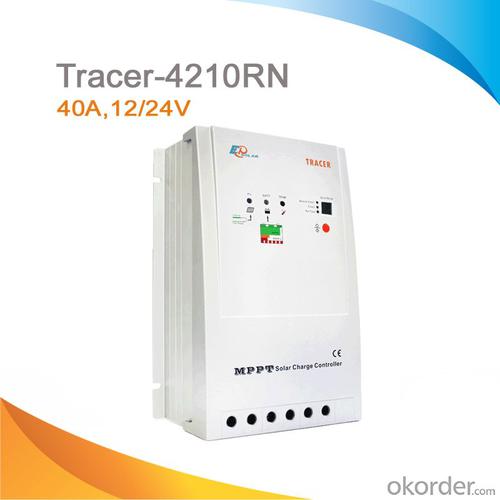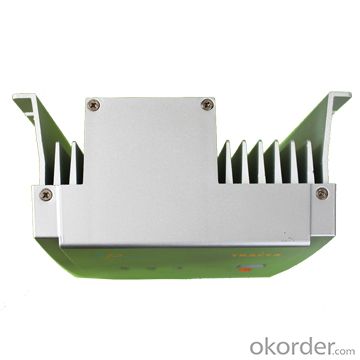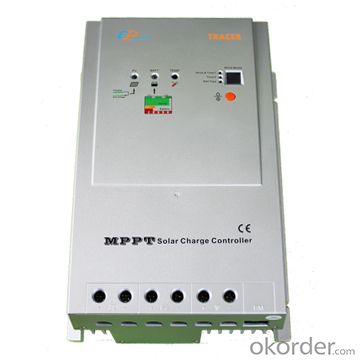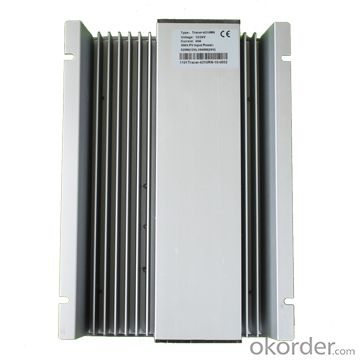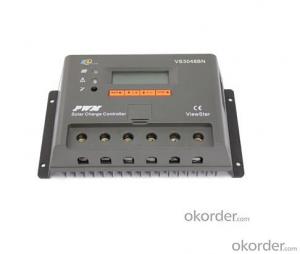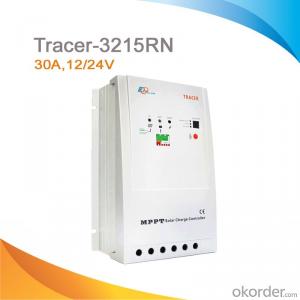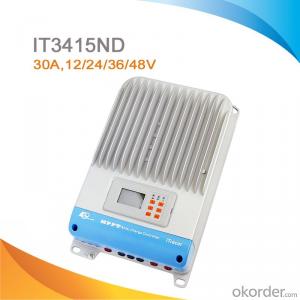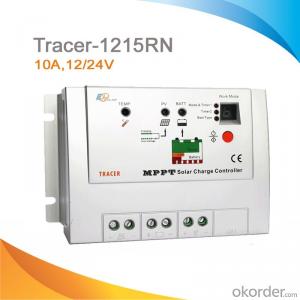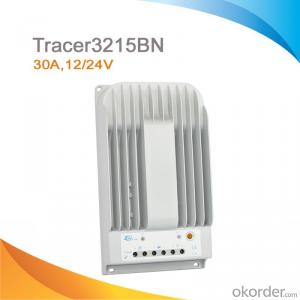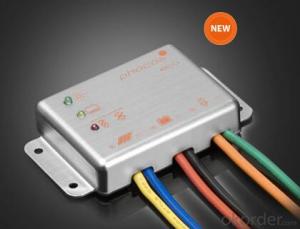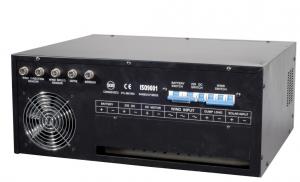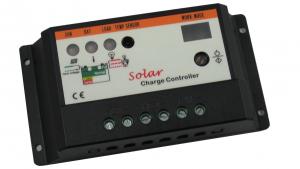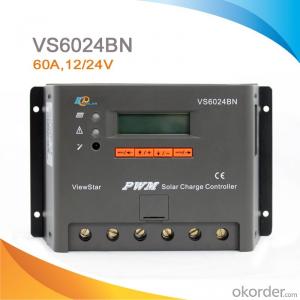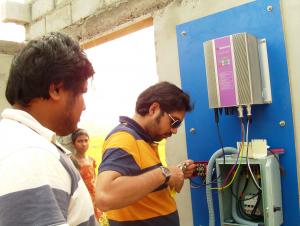MPPT Solar Charge Controller for Photovoltaic System 40A, 12/24V Tracer-4210RN
- Loading Port:
- Tianjin
- Payment Terms:
- TT or LC
- Min Order Qty:
- 50 unit
- Supply Capability:
- -
OKorder Service Pledge
OKorder Financial Service
You Might Also Like
Our solar controller is based on an advanced maximum power point tracking (MPPT) technology develped,dedicated to the solar system,the controller conversion efficiency up to 98%.
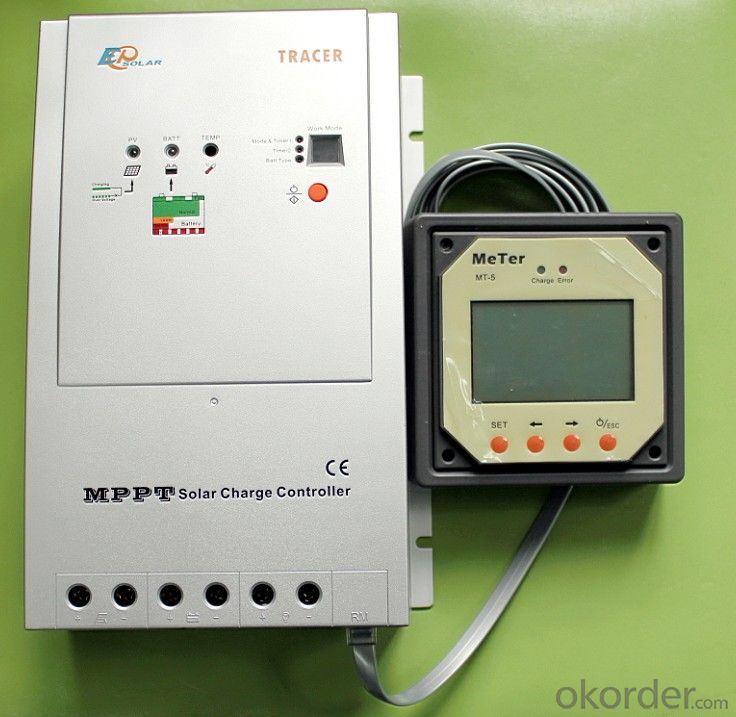
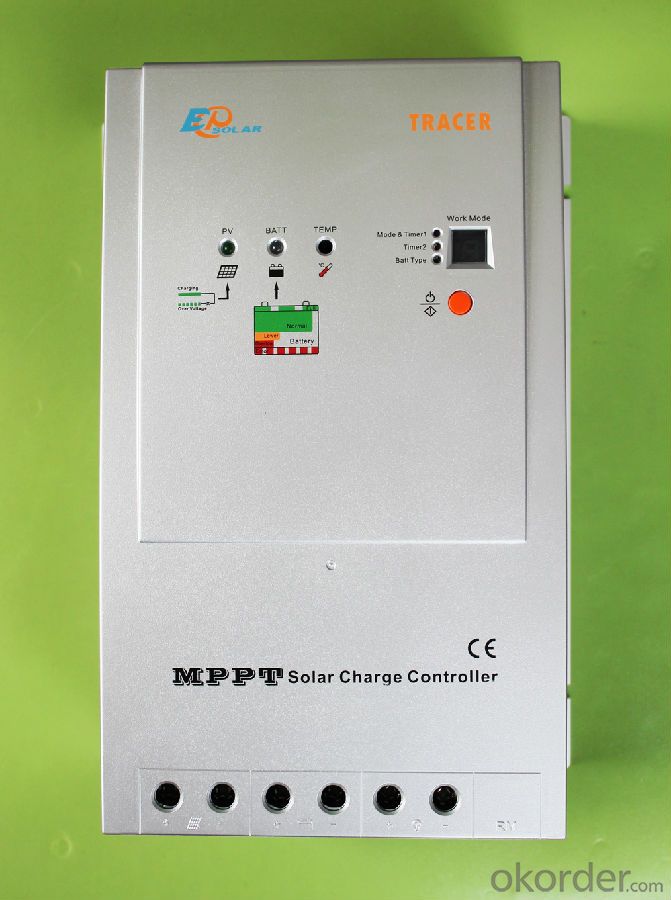
Specifications
MPPT solar charge controller
Max PV voltage 100V
12V 500W; 24V 1KW
solar lighting controller
Features:
·MPPT technology
·Peak conversion efficiency of 97%
·High Tracking efficiency of 99%
·Several seconds tracking speed
·4-Stage charge with PWM output
·Nature convection cooling
·Full power output in ambient temperature up to 45 ℃
·Temperature compensation
·Sealed, Gel and Flooded battery option
·Widely used, automatically recognize day/night
·Diversified load control
·RJ45 interface &optional meter
·2 years warranty
·CE certificate
Electronic Protections:
·PV short circuit protection
·PV reverse polarity protection
·PV overvoltage alarm protection
·PV over current protection
·Battery overcharge protection
·Battery over discharge protection
·Battery reverse polarity protection
·Load short circuit protection
·Load overload protection
Specification:
Model | Tracer-4210RN |
Rated system voltage | 12/24V auto work |
Rated battery current | 40A |
Rated load current | 20A |
Max.battery voltage | 32V |
Max.PV open circuit voltage | 100VDC |
Max.PV input power | 12V 500W, 24V 1000W |
Self-consumption | <10mA(24V) |
Charge Circuit Voltage Drop | ≤0.26V |
Discharge Circuit Voltage Drop | ≤0.15V |
Communication | TTL232 / 8 pin RJ45 |
Temp.compensation | -5mV/℃/2V |
Working temperature | -35℃~+55℃ |
Storage temperature range | -35℃~+80℃ |
Humidity | 10%-90% NC |
Enclosure | IP30 |
Altitude | ≤3000m |
Dimension | 242mm x 169mm x 91mm |
Mounting holes | 180mm x 160mm |
Mounting hole size | Φ5 |
Terminal | 25mm2 |
Weight | 2.05kg |
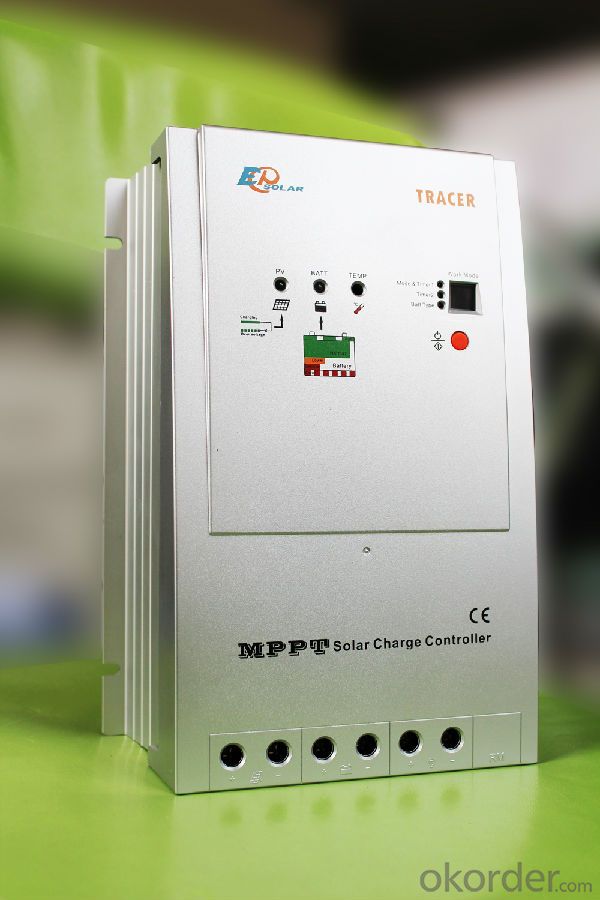

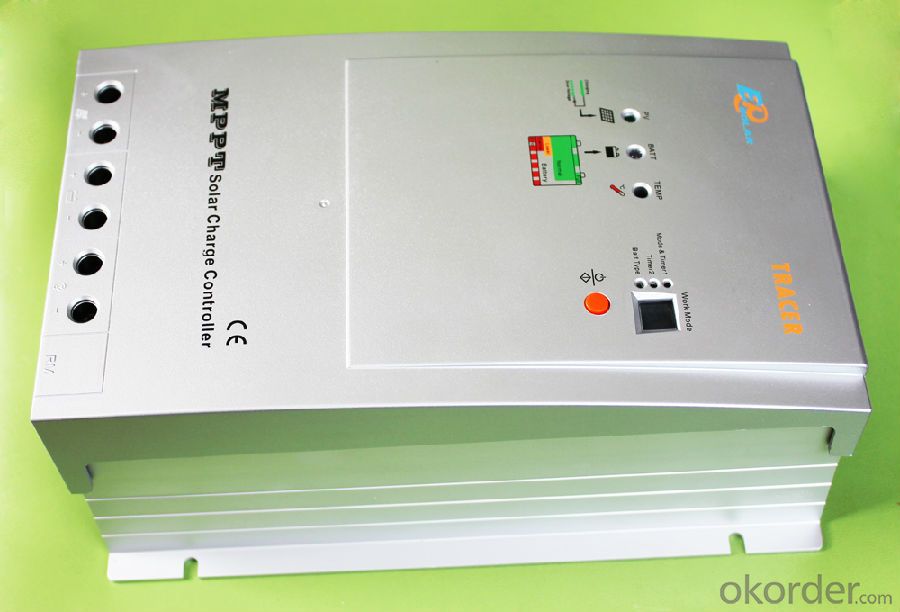
- Q: What is the role of a solar controller in preventing damage to the solar panels from environmental pollutants?
- The significance of a solar controller in safeguarding solar panels against harm caused by environmental pollutants cannot be overstated. Over time, pollutants like dust, dirt, pollen, and bird droppings can accumulate on the surface of the panels, diminishing their efficiency and overall performance. A solar controller, a device responsible for regulating and monitoring the charging and discharging of the solar panel's battery, plays a crucial role in ensuring the panels remain clean and fully functional. One of the primary tasks of a solar controller is to regulate the battery charging process. By carefully managing the flow of electricity from the panels to the batteries, it guarantees that the batteries receive the appropriate amount of charge without being overcharged. This prevents unnecessary strain on the panels caused by excessive electrical flow, which could potentially lead to damage. Furthermore, many modern solar controllers have sophisticated monitoring systems capable of detecting any fluctuations in the panels' efficiency. If a decrease in efficiency is detected, the controller can promptly alert the user, indicating a buildup of environmental pollutants on the surface of the panels. This timely information empowers the user to take action and clean the panels before any significant damage occurs. Moreover, select solar controllers are equipped with built-in cleaning mechanisms or interfaces that can be connected to automatic cleaning systems. These systems can be programmed to periodically or on-demand clean the solar panels, effectively eliminating any accumulated pollutants and ensuring maximum efficiency. In conclusion, the role of a solar controller in preventing damage to solar panels caused by environmental pollutants is diverse. It regulates the charging process, monitors efficiency, and provides alerts or interfaces for cleaning systems. By effectively managing these aspects, solar controllers help maintain the cleanliness and longevity of the panels, ultimately maximizing their performance and energy generation potential.
- Q: Can a solar controller be used with solar-powered streetlights?
- Yes, a solar controller can be used with solar-powered streetlights. A solar controller regulates the voltage and current from the solar panels to ensure efficient charging of the batteries used in solar-powered streetlights. It helps manage the charging process and protects the batteries from overcharging or discharging.
- Q: Can a solar controller be used with solar panels that are connected to a micro-inverter?
- Yes, a solar controller can be used with solar panels that are connected to a micro-inverter. A solar controller is typically used to regulate or control the charging of batteries in a solar power system. It is responsible for managing the flow of electricity from the solar panels to the batteries, preventing overcharging and ensuring optimal charging efficiency. In a system where solar panels are connected to a micro-inverter, the micro-inverter is responsible for converting the DC power generated by the solar panels into AC power that can be used by household appliances or fed back into the grid. The micro-inverter regulates the output voltage and frequency of the AC power. The solar controller, in this case, can still be used to regulate the charging of batteries in the system. It can monitor the current and voltage of the solar panels and adjust the charging parameters accordingly. The micro-inverter's role is limited to the conversion of power, while the solar controller can still optimize the charging process to ensure the batteries are properly charged and protected. Overall, the combination of a solar controller and a micro-inverter allows for efficient power conversion and optimal battery charging in a solar power system.
- Q: What is the role of a solar controller in maintaining battery health and longevity?
- The role of a solar controller in maintaining battery health and longevity is crucial. A solar controller, also known as a charge controller, is responsible for regulating the charge going into the battery from the solar panels. One of the main functions of a solar controller is to prevent overcharging of the battery. When a battery is overcharged, it can lead to the release of gases and electrolyte loss, which can significantly reduce its lifespan. The solar controller monitors the battery's state of charge and adjusts the charging current accordingly, ensuring that the battery is not overcharged. Furthermore, a solar controller also prevents the battery from being discharged too deeply. Deep discharging can cause irreversible damage to the battery, reducing its capacity and overall life expectancy. The controller monitors the battery voltage and disconnects the load when the voltage drops to a preset level, preventing further discharge. In addition to preventing overcharging and deep discharging, a solar controller also helps protect the battery from other potential issues. It regulates the charging current to prevent excessive heat build-up, which can damage the battery. It also provides protection against reverse current flow during nighttime or when the solar panels are not generating power. By effectively managing the charging process, a solar controller helps to maximize the battery's lifespan and overall health. It ensures that the battery is charged optimally and protected from harmful conditions that can lead to premature aging or failure. Therefore, investing in a high-quality solar controller is essential for maintaining battery health and longevity in solar-powered systems.
- Q: What is the difference between a solar charge controller and a solar regulator?
- A solar charge controller and a solar regulator are essentially the same thing. They are electronic devices used in photovoltaic systems to regulate the flow of electricity between the solar panels and the battery bank. Both terms are used interchangeably to refer to the same device.
- Q: How does a solar controller handle battery voltage regulation?
- A solar controller handles battery voltage regulation by continuously monitoring the voltage of the battery bank and adjusting the charging current accordingly. It ensures that the battery voltage remains within the desired range by automatically reducing or increasing the charging current from the solar panels. This helps prevent overcharging or undercharging of the batteries, maximizing their lifespan and performance.
- Q: Can a solar controller be used in grid-tied systems?
- No, a solar controller cannot be used in grid-tied systems. Grid-tied systems do not require a solar controller as they are connected to the electrical grid and rely on inverters to convert the DC power generated by solar panels into usable AC power for the grid. A solar controller is used in off-grid systems to regulate and control the charging of batteries.
- Q: Can a solar controller be used with an inverter?
- Yes, a solar controller can be used with an inverter. A solar controller regulates the charging of batteries from solar panels, while an inverter converts the DC power stored in batteries into AC power for use in household appliances. Together, they form an essential part of a solar power system.
- Q: Can a solar controller handle power surges from the generator?
- Yes, a solar controller can handle power surges from the generator. Solar controllers are designed to regulate and control the flow of electricity from the solar panels to the batteries or grid. They typically have built-in protection mechanisms, such as surge protection devices, to handle power surges and prevent damage to the system.
- Q: Can a solar controller protect batteries from deep discharge?
- Yes, a solar controller can protect batteries from deep discharge. The solar controller monitors the battery voltage and can disconnect the load when the voltage drops below a certain level, preventing the batteries from being over-discharged.
Send your message to us
MPPT Solar Charge Controller for Photovoltaic System 40A, 12/24V Tracer-4210RN
- Loading Port:
- Tianjin
- Payment Terms:
- TT or LC
- Min Order Qty:
- 50 unit
- Supply Capability:
- -
OKorder Service Pledge
OKorder Financial Service
Similar products
Hot products
Hot Searches
Related keywords




